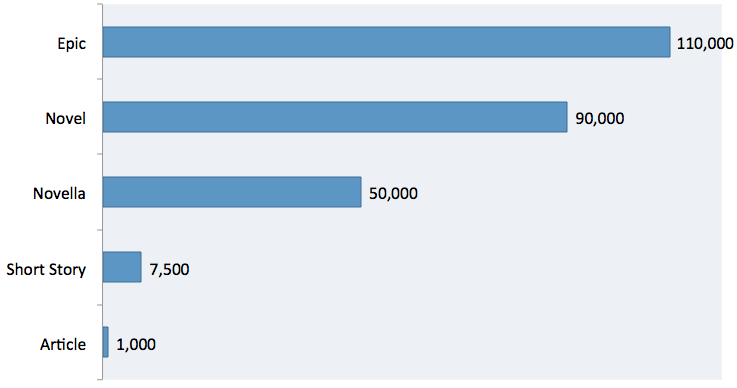The classic measurement for a printed book is 250 words per page. So 10,000 words yields roughly 40 pages of printed text. But over the years, font sizes, page size, and margins have become so diverse that it might call into question the classic measure. It’s especially suspect when discussing eBooks. Most reading devices allow the reader to change font size and because you can read on so many different types of devices, it becomes hard to even define what a book page means.
Average Story Lengths
Writing World has one of the better approximate word counts for most common story formats. Using this and several other sources online as a guide, I came up with this chart to illustrate the difference between story types:
The sweet spot for a novel seems to be somewhere between 50,000 and 90,000 words. To me, 90,000 words is really pushing the line of a “pick up and read” book. Colleen Lindsay (who currently works for Penguin Books) has an awesome blog post discussing the “why” behind story word counts. It basically breaks down to this:
- Novels that are longer than 90,000 words cost more to print (more printed pages increases the cost per book).
- Longer novels are almost exclusively for published and established authors who have the flexibility to break the rules.
- The general guidelines for the word counts on the graph above are actually more specific to a genre. For instance, a fantasy novel will typically be 25% longer than a mystery novel.
- There’s also an interesting trend lately towards even shorter novels.
My word count goal for Tales of the Macabre West is 70,000 words (about 280 pages). I’m splitting the middle of the typical novel range. Technically, since it is a collection of short stories, it is more like 7 novellas that range between 5,000 and 13,000 words. I’m thinking 280 pages is a respectable number and honestly, there’s just no reason to pad anything. I want the stories to be tight, well-paced, and readable. But the above was helpful in deciding on when I was “done.”

